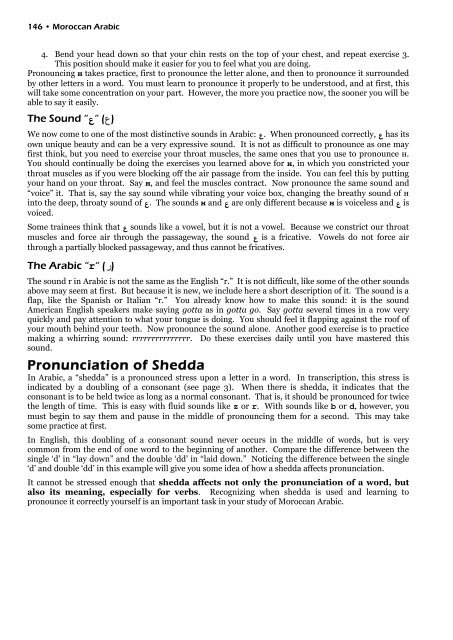Moroccan Arabic textbook 2011
Moroccan Arabic textbook 2011
Moroccan Arabic textbook 2011
You also want an ePaper? Increase the reach of your titles
YUMPU automatically turns print PDFs into web optimized ePapers that Google loves.
146 • <strong>Moroccan</strong> <strong>Arabic</strong><br />
4. Bend your head down so that your chin rests on the top of your chest, and repeat exercise 3.<br />
This position should make it easier for you to feel what you are doing.<br />
Pronouncing н takes practice, first to pronounce the letter alone, and then to pronounce it surrounded<br />
by other letters in a word. You must learn to pronounce it properly to be understood, and at first, this<br />
will take some concentration on your part. However, the more you practice now, the sooner you will be<br />
able to say it easily.<br />
) ( “ع“ The Sound<br />
We now come to one of the most distinctive sounds in <strong>Arabic</strong>: .ع When pronounced correctly, ع has its<br />
own unique beauty and can be a very expressive sound. It is not as difficult to pronounce as one may<br />
first think, but you need to exercise your throat muscles, the same ones that you use to pronounce н.<br />
You should continually be doing the exercises you learned above for н, in which you constricted your<br />
throat muscles as if you were blocking off the air passage from the inside. You can feel this by putting<br />
your hand on your throat. Say н, and feel the muscles contract. Now pronounce the same sound and<br />
―voice‖ it. That is, say the say sound while vibrating your voice box, changing the breathy sound of н<br />
into the deep, throaty sound of .ع The sounds н and ع are only different because н is voiceless and ع is<br />
voiced.<br />
Some trainees think that ع sounds like a vowel, but it is not a vowel. Because we constrict our throat<br />
muscles and force air through the passageway, the sound ع is a fricative. Vowels do not force air<br />
through a partially blocked passageway, and thus cannot be fricatives.<br />
The <strong>Arabic</strong> “r“ ( )<br />
The sound r in <strong>Arabic</strong> is not the same as the English ―r.‖ It is not difficult, like some of the other sounds<br />
above may seem at first. But because it is new, we include here a short description of it. The sound is a<br />
flap, like the Spanish or Italian ―r.‖ You already know how to make this sound: it is the sound<br />
American English speakers make saying gotta as in gotta go. Say gotta several times in a row very<br />
quickly and pay attention to what your tongue is doing. You should feel it flapping against the roof of<br />
your mouth behind your teeth. Now pronounce the sound alone. Another good exercise is to practice<br />
making a whirring sound: rrrrrrrrrrrrrrr. Do these exercises daily until you have mastered this<br />
sound.<br />
Pronunciation of Shedda<br />
In <strong>Arabic</strong>, a ―shedda‖ is a pronounced stress upon a letter in a word. In transcription, this stress is<br />
indicated by a doubling of a consonant (see page 3). When there is shedda, it indicates that the<br />
consonant is to be held twice as long as a normal consonant. That is, it should be pronounced for twice<br />
the length of time. This is easy with fluid sounds like z or r. With sounds like b or d, however, you<br />
must begin to say them and pause in the middle of pronouncing them for a second. This may take<br />
some practice at first.<br />
In English, this doubling of a consonant sound never occurs in the middle of words, but is very<br />
common from the end of one word to the beginning of another. Compare the difference between the<br />
single ‗d‘ in ―lay down‖ and the double ‗dd‘ in ―laid down.‖ Noticing the difference between the single<br />
‗d‘ and double ‗dd‘ in this example will give you some idea of how a shedda affects pronunciation.<br />
It cannot be stressed enough that shedda affects not only the pronunciation of a word, but<br />
also its meaning, especially for verbs. Recognizing when shedda is used and learning to<br />
pronounce it correctly yourself is an important task in your study of <strong>Moroccan</strong> <strong>Arabic</strong>.


